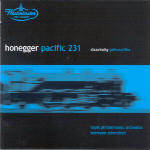Although his available discography is quite patchy, Hermann Scherchen’s reputation as a passionate and able advocate for twentieth-century music is well deserved. Certainly, this pair of 1954 recordings often provides a glimpse of this idiosyncratic artist at his best. The big draws here are Petrushka and Pacific 231, but don’t pass by the array of other Honegger works included. Along with a stately paced “Chant de joie” and a brash, percussion-heavy Mouvement symphonique No. 3, Scherchen takes delight in all of Honegger’s incredibly vibrant portraiture: the roar and pitching waves of Shakespeare’s “Tempest”, the dreamy Summer Pastoral, and a snapshot of athletes on the field in Rugby.
From the confounding rhythmic highjinks of Petrushka to the ultra-current, “popular” sound of the saxophone in Honegger’s Mouvement symphonique no. 3, these scores are very much products of their time. So, too, is Scherchen’s own, particularly post-war sensibility; perhaps “brutal” is too strong a word, but he commands all these works with a burly muscularity. While Scherchen’s interpretations most likely won’t abrogate your reference recordings, you’re sure to learn a lot from him about this music, as not the slightest detail escapes his scrutiny. (The same cannot be said of his players, however; the strings in particular tend to become rather sloppy in the more frenzied sections.) In the end, though, it’s all about character: phrases are vividly pointed, and his palette is inevitably Technicolor. He gets Petrushka’s burlesquerie dead-on. While Scherchen is definitely not a conductor for everyone, his fans will find plenty of thrills here. And although these masters are mono, there’s no reason to worry about substandard audio quality; clarity is very good, and the sound quite spacious.
































